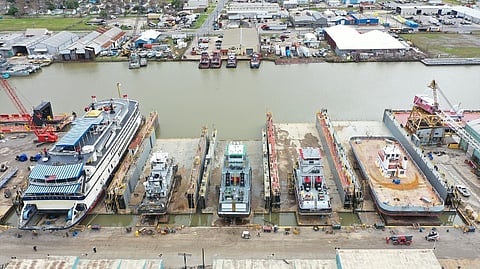Bipartisan "SHIPS for America Act" bill to introduce increased protectionism, industry subsidies and red-tape-cutting to support US maritime industries
In the United States today, Democrat Senator Mark Kelly, Republican Senator Todd Young, Democrat Representative John Garamendi and Republican Representative Trent Kelly introduced the "shipbuilding and harbor infrastructure for prosperity and security" (SHIPS) for America Act, legislation designed to revitalize the United States shipbuilding and commercial maritime industries.
"After decades of neglect, the United States has a weakened shipbuilding capacity, a declining commercial shipping fleet that is dwarfed by China, and a diminished ability to supply the US military during wartime," claimed Kelly.
"The bipartisan proposal would restore American leadership across the oceans by establishing national oversight and consistent funding for US maritime policy, incentivizing domestic shipbuilding, enabling US-flagged vessels to better compete in international commerce, rebuilding the US shipyard industrial base, and expanding the mariner and shipyard workforce.
“We’ve always been a maritime nation, but the truth is we’ve lost ground to China, who now dominates international shipping and can build merchant and military ships much more quickly than we can.
“The SHIPS for America Act is the answer to this challenge. By supporting shipbuilding, shipping, and workforce development, it will strengthen supply chains, reduce our reliance on foreign vessels, put Americans to work in good-paying jobs, and support the navy and coast guard’s shipbuilding needs.
“America has been a maritime nation since our founding, and seapower was a significant contributor to our rise to being the most powerful nation on earth. Unfortunately, the bottom line now is America needs more ships," added Young.
"Shipbuilding is a national security priority and a stopgap against foreign threats and coercion. Our bill will revitalize the US maritime industry, grow our shipbuilding capacity, rebuild America’s shipyard industrial base, and support nationwide workforce development in this industry. This legislation is critical to our warfighting capabilities and keeping pace with China."
The SHIPS for America Act would coordinate US maritime policy by establishing the position of maritime security advisor within the White House, who would lead an inter-agency maritime security board tasked with making whole-of-government strategic decisions for how to implement a national maritime strategy.
The bill also establishes a maritime security trust fund that would reinvest duties and fees paid by the maritime industry into maritime security programs and infrastructure supporting maritime commerce.
The sponsors outlined a national goal of expanding the US-flag international fleet by 250 ships in 10 years by creating the "strategic commercial fleet program", which would facilitate the development of a fleet of commercially operated, US-flagged, American crewed, and domestically built merchant vessels that can, "operate competitively in international commerce."
A goal of the bill is to enhance the competitiveness of US-flagged vessels in international commerce by establishing a rulemaking committee on commercial maritime regulations and standards to, "cut through the US Coast Guard’s bureaucracy and red tape that limits the international competitiveness of US-flagged vessels, requiring that government-funded cargo move aboard US-flag vessels, and requiring a portion of commercial goods imported from China to move aboard US-flag vessels starting in 2029."
The bill would expand the US shipyard industrial base, for both military and commercial oceangoing vessels, by establishing a 25 per cent investment tax credit for shipyard investments, transforming the Title XI federal ship financing program into a revolving fund, and establishing a "shipbuilding financial incentives" program to "support innovative approaches" to domestic ship building and ship repair.
Kelly said he wishes to accelerate next-generation ship design, manufacturing processes, and ship energy systems by establishing the US Center for Maritime Innovation and regional hubs across the country.
Finally, the bill would make investments in maritime workforce by establishing a maritime and shipbuilding recruiting campaign, allowing mariners to retain their credentials through a newly established "merchant marine career retention program", investing in infrastructure needs for the US Merchant Marine Academy, and supporting State Maritime Academies and Centers for Excellence for Domestic Maritime Workforce Training and Education.
The bill also makes changes to streamline and modernize the US Coast Guard’s Merchant Mariner Credentialing system.


